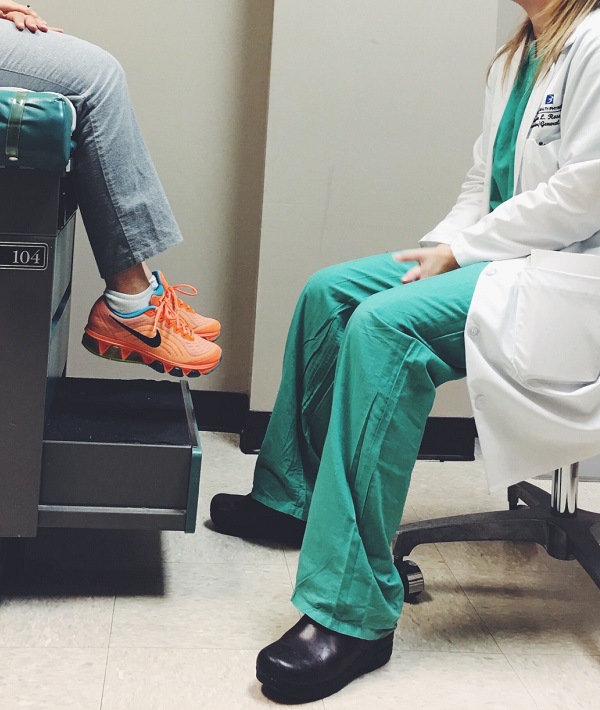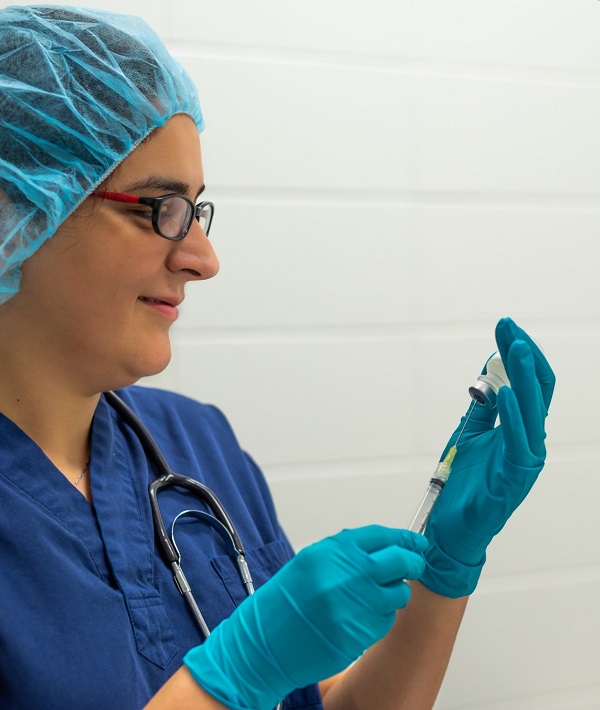
Doctors need to know

If anyone knows how weird bodies can be, it's our doctors. Yet, a surprising number of patients struggle to speak up about what's going on with their bodies because they're embarrassed or feel rushed. That stops today. Without a complete medical history, doctors have a harder time making an accurate diagnosis, which could delay a patient's care and chance for recovery. Keep reading to find out which questions you should never avoid asking your provider.
Can you please listen to me?

Doctors have a wealth of knowledge, but they're not gods. No matter how intimidated or embarrassed a patient is, they should always make sure their concerns and questions are being heard by their doctors. If a doctor doesn't seem to be listening or interrupts a patient, they need to speak up. Patients have to be their own advocates and know that if their doctor isn't willing to hear them out, it may be time to find a new provider.
Will you screen me for STDs?

Part of having an active, healthy sex life includes regular screening for STDs and STIs. However embarrassing it may be to approach this topic with our doctors, it's essential that we ask to be screened. The Centers for Disease Control recommends, at a minimum, that sexually active teens and adults be screened at least once a year for HIV, and that sexually active women under 25 be screened annually for chlamydia and gonorrhea.
Are my bowel movements normal?

Embarrassing or not, everyone poops and talking about our bowel movements can reveal important information about our health. The regularity of our stools and their color, size and consistency can cue doctors to a variety of ailments, including constipation, irritable bowel syndrome, ulcers, infections and more. Any patient with uncomfortable bowel movements, including watery loose stools or hard-to-pass pellets, needs to speak up.
Why do I bleed when I poop?

Speaking of poop, patients who see blood in their stool or on their toilet tissue need to ask their doctor what might be going on. While bloody stools can be a symptom of hemorrhoids, other ailments, including anal fissures, peptic ulcers, cancerous polyps and diverticulitis, can also cause bleeding in the GI tract and need to be examined. Your doctor will want to know the color of the blood (bright red indicates a lower-GI issue), amount and how often it's experienced.
Why am I so gassy?

Flatulence may be embarrassing, but it's not unique. Did you know that healthy individuals can fart upwards of 14 times per day? Since the average person has between .5 and 1.5 liters of gas in their digestive tract, burping and farting aren't uncommon. However, painful gas, or a sudden increase in gas production could indicate more serious medical conditions, like Crohn's Disease or even ovarian cancer.
Why do I have facial hair?

Ladies, having a little bit of facial hair is common. For those who have more than a little, you're not alone. Approximately five percent of women in the U.S. experience hirsutism, or excessive facial hair. While the condition can be embarrassing, it can also be indicative of a possible medical condition, including poly-cystic ovarian syndrome and adrenal gland disorders, meaning doctors need to know about your chin stubble.
What happened to my libido?

Whether you're completely uninterested in sex or have experienced a massive increase in your desire, you need to talk to your doctor. Low sex drive in women can be caused by medical conditions like depression, high blood pressure, arthritis, cancer, diabetes and even certain medications. A suddenly high sex drive could also be a symptom of increased testosterone, which a doctor can measure with blood tests.
Is my vaginal discharge normal?

Repeat after us: vaginal discharge is normal. Like self-cleaning ovens, our vaginas do the heavy lifting to keep our lady parts clean and in good working order. Healthy discharge varies among women, meaning some of us have a lot while some may not have any. If your usual discharge changes in amount, texture, color or smell, it's important to talk about it with your doctor to rule out any possible infections.
What is going on with my menstrual cycle?

Another subject women can be embarrassed discussing with their doctors are issues with their menstrual cycle. Aside from asking patients the date of their last period, doctors don't often do a lot of investigating unless we mention a problem. Delays, shorter or longer cycles and even an increase in pain and blood loss are all important symptoms that doctors need to be aware of in order to diagnose a possible medical issue.
Why do I smell different?

Regardless of what advertisements tell us, women's bodies don't naturally smell like flowers. While individual bodies vary, any vaginal odor that is particularly concerning, including fishy smells or unusually strong, unpleasant scents, should be discussed with a doctor to rule out any possible infections. Recurrent bad breath (halitosis) and excessive armpit odor are also worthy of a mention to your physician.
Why am I so sweaty?

Sweat is our body's primary way of cooling down when it's overheated, but it's also a mechanism triggered by stress and anxiety, which is why some people experience sweaty palms before job interviews. While sweat is normal, excessive sweat isn't. If a patient notices they're perspiration is working overtime, they should mention it to their doctor, who can evaluate them for a condition known as hyperhidrosis.
Am I 'normal' down there?

Patients should know that there is no such thing as normal when it comes to genitalia. While there are certain structures to our reproductive organs, how they look varies from one individual to the next. From size and shape to the amount of pubic hair, it's common for people to wonder if their vaginas, penises and scrota are normal. If a patient is truly concerned with their anatomy, it's absolutely OK to bring it up with their doctor and have an exam to see if there are any areas of concern.
Will drinking or smoking affect this medication?

One thing patients should definitely ask their doctors about is how their prescription medications might interact with alcohol and recreational drugs. While a patient may not want to admit to indulging in addictive substances, their doctor needs to know if they regularly consume any type of drugs or alcohol because it could cause a serious medical reaction (even death) when taken together.
Do I drink too much alcohol?

Doctors need to be informed of how much alcohol their patients are imbibing, even if it feels embarrassing to talk about. What may seem like a normal amount of alcohol consumption to a patient could actually be considered an unhealthy habit by a doctor. Excessive drinking can lead to medical issues like cancer, cardiovascular disease, liver disease and more, and should be discussed with every patient who regularly enjoys adult beverages.
Do I have any health risks?

Asking your doctor if you're at-risk for health conditions based on your lifestyle, dietary choices or even your genetics, is an important part of advocating for your own health and well-being, even if it means hearing potentially scary answers. Talking with your physician about your risk for cancer, diabetes, heart disease and other health concerns is a great way to become informed about what symptoms you need to look out for and what tests you should take to keep tabs on your health.
Can you re-explain my test results?

When a doctor explains any type of test result to their patient, whether it's blood labs, an X-ray or MRI, it's crucial the patient understands what they're being told. Short appointment times make the brief period patients have to interact with their doctors feel rushed, leaving them hesitant to ask for clarification about diagnoses and therefore less likely to understand their treatment options.
What are the side effects?

Patients need to know that when it comes to their healthcare, they have choices. While we trust our doctors to make accurate diagnoses and provide the best possible treatment plans, it's not unreasonable for any patient to ask about the side effects they might encounter. Learning about what to expect as well as asking about alternative treatment options empowers patients to have an active role in their healthcare.
Do I need to make any changes?

Change is hard, which is probably why patients are hesitant to ask their doctors if there's anything they can do to be healthier. The question opens the door for physicians to talk about a patient's diet and exercise habits as well as other lifestyle choices that could impact their health. While the conversation may be uncomfortable, it can inspire a patient to adopt healthier choices in their life, which is always a positive.
What is going on with my weight?

Did you know that sudden weight loss, especially when a patient hasn't made any lifestyle changes, can be a major medical clue for physicians? Unexplained weight loss could be a sign of serious illness, including adrenal dysfunction and even cancer. Likewise, sudden weight gain should also be discussed, as it could be related to hormonal disorders, diabetes or even depression.
Can I get a referral to a mental health provider?

No one should ever feel embarrassed to advocate for their mental health. If your insurance requires you to get a referral from your primary doctor or your MD is the only medical resource you have, it's important you share any mental health concerns you're having. From managing stress and anxiety to getting the right medication for depression or other mental health disorders, the first step in getting better is asking for help.




